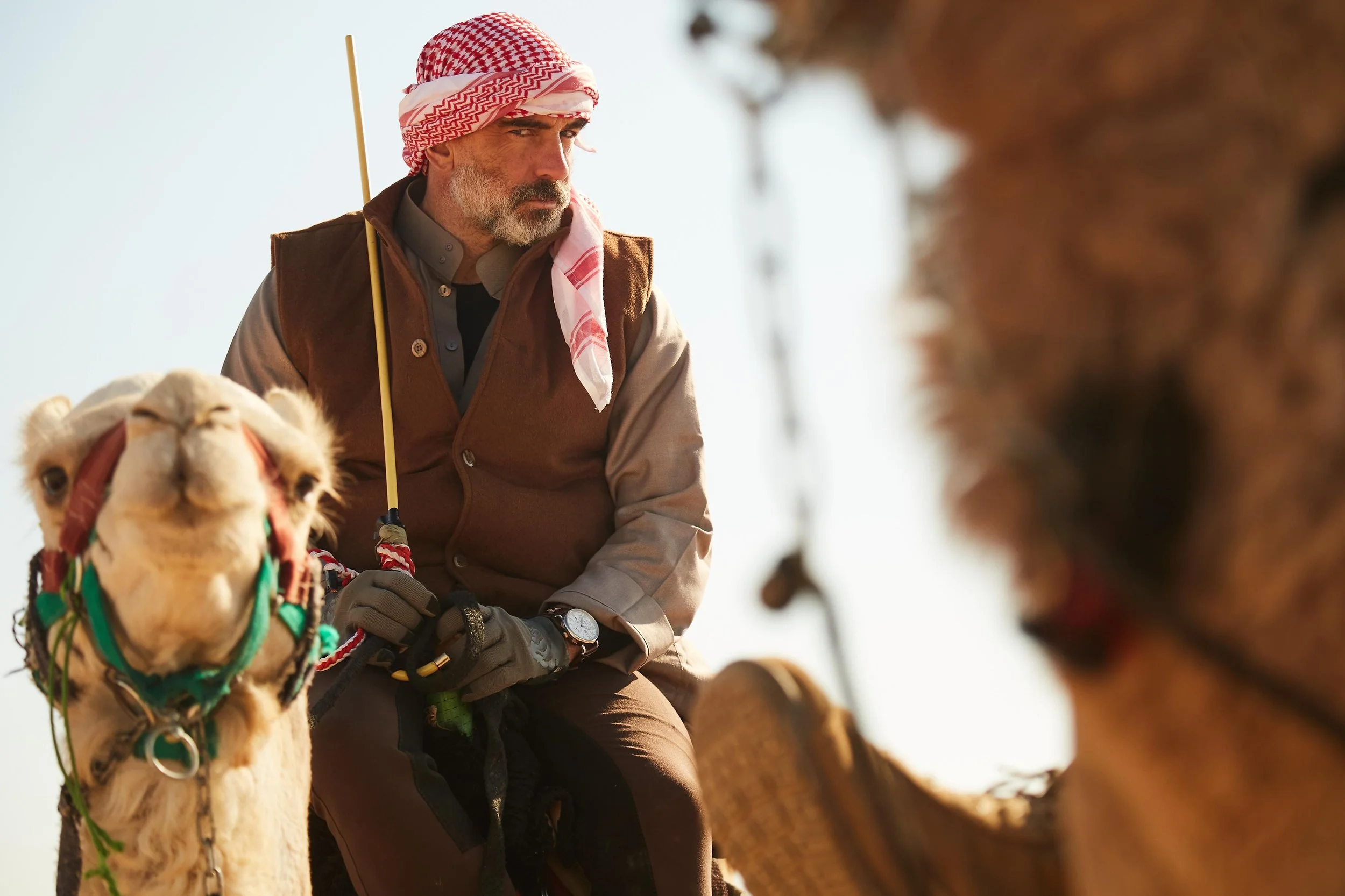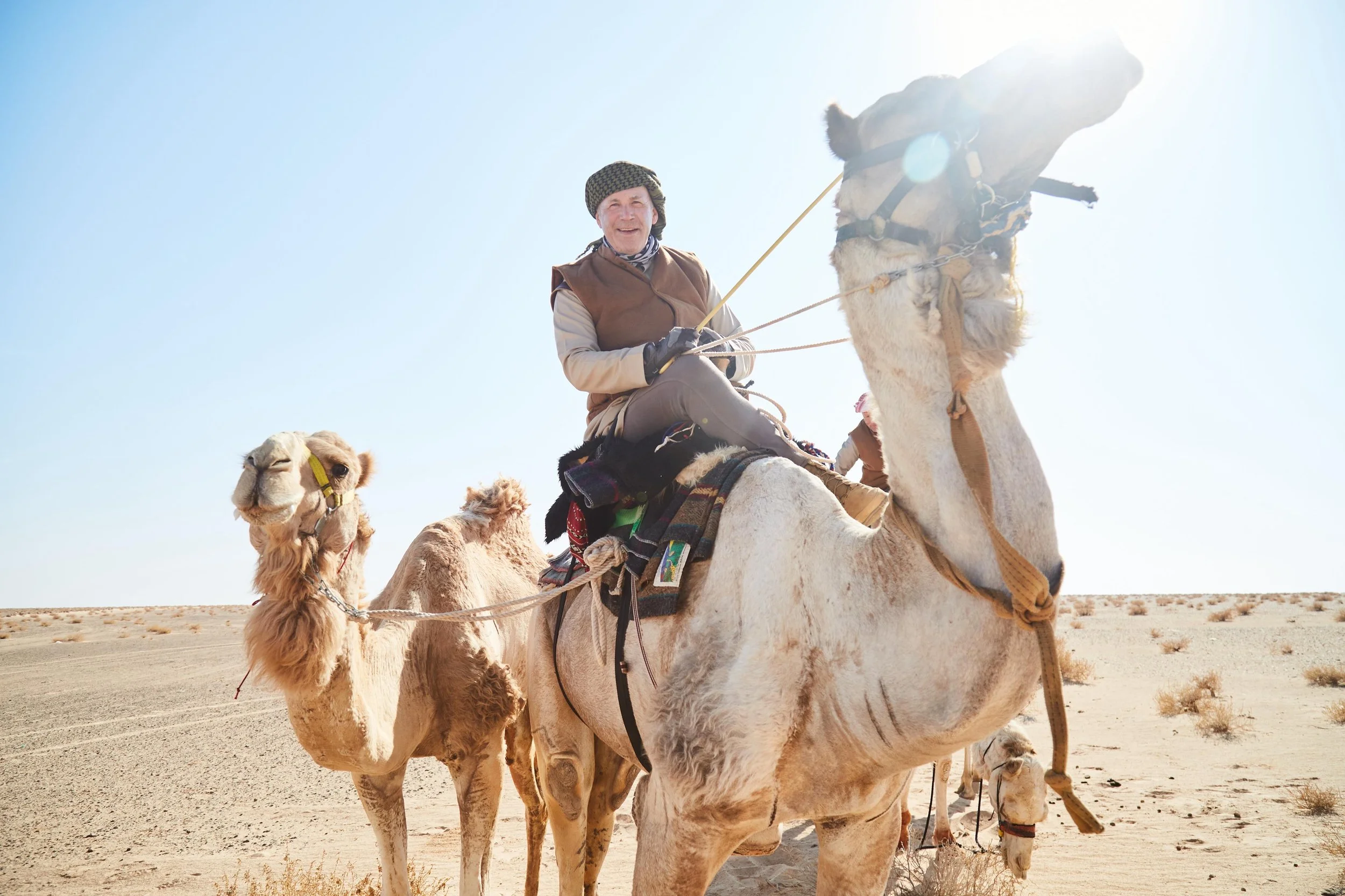A Prince, Crevasses, and Camel Nymphomania
Waking up in Camp 11 was significant from two perspectives. The first was that Peter W., who had been one of the original driving forces of the Trek, had to leave us. He’d been with the team since 6th January, completed the soft sand driver training, and stayed with us as we entered Saudi Arabia on the 9th and set off on the 14th. He'd fulfilled his role as a driver in the support team to the full, but due to work commitments, he now had to return to his professional role in the UAE. I felt genuinely sad for him, not least because I sensed how much it irked him to leave. When he came to say goodbye, as ever, I didn't dwell. Life in the military had instilled in me to keep goodbyes short, and it's a habit I have never managed to break. Peter would now be driven up the road to Al Qurayyat airport, close to the Jordanian border, a drive of about 4 hours. He'd then have to fly to Riyadh, survive the rigours of transferring flights there (if you know, you know). He'd then head back to a warm shower, soft bed, and air-conditioning in Dubai. Something I knew he'd have traded for the world to stay. However, we'd next see him in Aqaba; if we made it.
My second perspective was that we were now starting Day 12. Which meant we'd tucked some 550 very tough kilometres behind us, so from today we should be figuratively downhill on the total of 1,100 kilometres we'd have to complete in order to arrive in Aqaba.
From a personal perspective, the considerable blister on my right buttock seemed to be healing, although I didn't realise it would be weeks before the dressing could come off. For now, the only thing I knew was that the pain of it wasn't constantly on my mind, so either the nerves in my arse had laid down their lives for the Trek, or the miracle of healing and Ged's medical mastery had worked. Additionally, I'd had about a three-day period where, for whatever reason, my urine had been blood-soaked. I'd had this on previous camel expeditions, so I wasn't too worried, but I will admit, it was always a big relief on the first pee of riding day when my urine came out clear.
Without making too much of a pun of it, I knew that if I could get through Day 12 without the blister kicking off or red urine, I was over the hump.
My mind turned to Wadi Sorhan and what would await the driving team over the next couple of days. Lawrence lost two men here to snake bites and described the area as "infested", so I just hoped that the temperature would stay cool enough to keep the reptiles in their holes, which we saw everywhere. However, you have probably guessed it. Despite the altitude, which was about 1,500 meters above sea level, and that previous days had been freezing, Wadi Sorhan produced balmy, warm days, just what we didn't want.
We left the humdrum of the Camp on time. Our tummies were full of the egg "whatever" recipe that Simon had prepared that morning. That said, we didn't mind his occasional culinary experiment with limited resources. The team knew we had reached the halfway mark in terms of distance, and we only had two more days before we would pass the calendar halfway mark. Additionally, Day 13 was a rest day, so we were all eager for it.
We walked the camels out of the pleasant bowl feature that had been Camp 11, and joined a track that would take us to the point that we'd need to cross Highway 65. We'd then attempt to straight-line it north-west towards Camp 12, which was in the heart of the Wadi.
The terrain was flat and textbook desert — in parts soft sand, in others hard sand, in others salt lake, and in others “baby heads”. On the upside, most of the ground underfoot was kind to the camels' feet; on the downside, this was quicksand territory, and, of course, that of snakes and scorpions.
The King Salman Royal Nature Reserve Special Forces Rangers were already waiting for us at the Hwy-65 crossing point. They stopped all the traffic, and we trotted across, waving a thank you to the drivers who had stopped.
Throughout the entire Trek, any road users we came across were friendly in the extreme. In fact, the only issue we faced was that they were in the habit of blaring their horns in approval, which threatened to spook the camels.
We then trotted on the route, well north of the road and any habitation. It was a warm but relatively easy day. On our first break, I checked my phone and Prince Musaed bin Naif Al Sudairy had texted me. He had been invaluable during our preparation in helping me find the camels in Saudi Arabia. Today, he wanted to know the precise location of Camp 12 so he could meet us there. It would be very remote, but I passed him Simon's coordinates because Simon would be there and establish the Camp long before the riders would arrive.
About 3 hours into the ride, we were making good pace and came across a herd of pristine white camels, which I knew were a particular Saudi breed. I also knew that the herd would consist of females, "clipped" males and youngsters. Breeding males are so nuts that they can't be left or trusted to free-range. As we trotted by them, the “ladies” were clearly thrilled to not only see some strange camels trotting by, but also that our camels were, in part, large, breeding, and clearly up-for-it males. Before we knew it, hundreds of white female camels and their young were trotting alongside us, presumably in search of a new husband.
Out of nowhere, we then spotted a herdsman, fruitlessly running after them, presumably seeing his employment flash before his eyes as he explained to what must have been a very wealthy owner that four Brits had rustled his hundreds of potentially prize-winning white camels without even trying.
The Special Forces Rangers went alongside Richard's Defender, and he radioed me to say, Please slow to a walk so they could re-herd the flock. We slowed, admittedly amused by it all, while the Rangers used their very specially fitted FJ Cruisers to round up the flock and herd them back to the area of their previous grazing. Not only had the riders enjoyed the experience, but it was pretty evident by the amount of saliva and grunting produced by our boy-camels that they had enjoyed being the centre of female desire-focused attention.
We then came onto a completely flat, orange-brown, sand desert with the ground firm under about a centimetre of sand. We could see a Defender ranging forward in the distance, and then suddenly deviating and coming to a halt. Henry came up on the radio to say, "Be careful, there are some big drops in this". I slowed the group to a walk to see what he meant and very soon saw fissures across the sand that opened up into a deep crevasse. If either a Defender or Camel went into one of these, it would be curtains. This was what the Arabs referred to as "quicksand". It's not the stuff that looks normal and sucks you in; rather, it's when a crust forms over a crevasse and gives way under any weight, and before you know it, you're 2 metres down with a broken leg, axle, or worse. Not a good place to be in any desert.
From here, the Defender would move forward until we cleared the "lake", and we stayed in its tracks.
The sand then turned white and was almost painful on the eyes in the bright sun. We stopped by a small knoll, which had some vegetation for the camels. This was quite idyllic given the severity of everything around it. Again, I thought this would be where Lawrence and his group would have stopped; it wasn't an oasis, but it was as close to one as you would get in this killer of a wadi and an irresistible resting place for any traveller.
By the time we'd passed 3pm, morale was high. The temperature was nudging into the low 30s, the terrain was gentle, and we closed in on the Camp we knew we would arrive well before sunset.
The dunes became undulating, which was very similar to the desert I knew locally in Dubai. We received a message from Rory that Prince Musaed and other dignitaries were at the Camp, so we grouped together and trotted in as a team.
The Prince greeted me like an old friend and invited me for coffee. As I walked with him, I introduced him to the team, and as we rounded a dune, I was staggered to see he had arranged two huge majlis tents. We sat in one and were joined by the local Governor and Chief of Bedouin; we all enjoyed Arabic coffee and dates on beautiful carpets, gilded chairs, in the middle of nowhere.
Prince Musaed explained that he had food arranged for 7 pm, so I would need to brief the team. I finished my coffee, went back to ensure my camels were okay, fed and watered them, and then changed out of my riding kit into my camp kit.
By 6.30, the sun had gone down, and the thermometer dropped like a brick. Simon had got the fire going; he was clearly happy he did not have to cook tonight. We had our routine team O-group brief, where all operational aspects of today and tomorrow were covered. We then made our way to the majlis, where trays of whole goat, camel meat, rice, vegetables, and Arabic sweets awaited. We ate like kings, or very hungry men.
On completion, the Prince joined us by the fire and we exchanged anecdotes under a star show that only the remote desert night-sky can offer. For us, it would be a late night, not going to sleep until 10.30, but it had been worth it. This was traditional Saudi hospitality at its very finest; gracious and generous.
The riders went to sleep that night, knowing they had just one more day to push until their rest day. However, what we didn't know was that it would turn out to be the longest and toughest day.
Wadi Sorhan wasn't done with us yet and would exact its revenge just for our presence.




